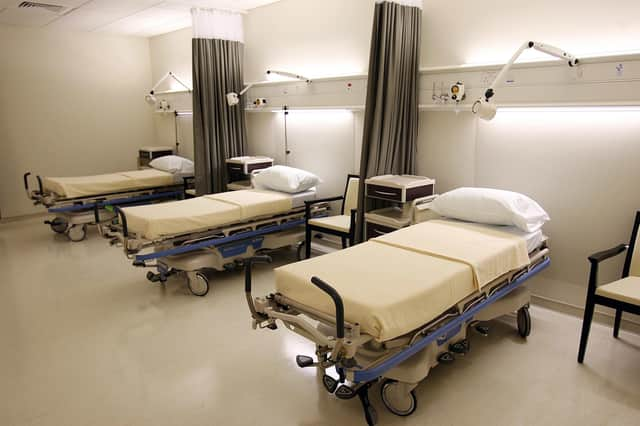More than 307,000 in NI now waiting for hospital appointment - with warning from Robin Swann that worse is to come


The Department of Health today published the quarterly waiting times statistics, relating to the position at the end of March, just as the first effects of the coronavirus pandemic were beginning to be felt in the health service in Northern Ireland.
The ministerial target is that at least 50% of patients should wait no longer than nine weeks for a first outpatient appointment with a consultant, with no patient waiting longer than 52 weeks.
Advertisement
Hide AdAdvertisement
Hide AdThe statistics reveal that a record total of 307,066 patients were waiting for a first consultant-led outpatient appointment at the end of March, 2,049 more than at the end of last year and 18,312 more than at at the same time last year.
Almost four fifths (79.1%) of patients were waiting more than nine weeks for their appointment, and almost two fifths (38.1%) of patients were waiting more than a year for their appointment.
In addition a total of 93,641 patients were waiting to be admitted to hospitals in Northern Ireland at the end of March, up 7.1% from 12 months previously.
Health Minister Robin Swann has described the latest waiting time statistics as “very disappointing but not unexpected”.
Advertisement
Hide AdAdvertisement
Hide AdThe minister stated: “No one has been in any doubt that performance in this area has been under intense pressure for some time, although steps were being taken to build capacity whilst implementing new innovative ways of working.
“The onslaught of coronavirus is something that we could never have contemplated when we started the transformation of health and social care, and the truth is that today’s statistics only cover the position to the end of March, so simply provide an early indication of the full impact of the virus on waiting times. “I need to be very honest and signal that the figures for the next quarter, when published, will make even more depressing reading.”
“But, just as there was no doubt about scale of the challenge before Coronavirus, equally no one can be in any doubt that a quick fix is simply not realistic. Successfully attacking these waiting times will take time and money, and can only be achieved if additional long term funding is made available – such funding must be over and above that needed to run existing services. I have been very clear on this point since taking up post.
“Even with significant additional investment, the task of putting this right will be immensely challenging. For the foreseeable future, we will have to plan around the continuing threat posed by Covid-19. This will severely constrain the capacity of our hospitals to scale up activity - social distancing in hospitals means reduced numbers in waiting rooms and on theatre lists.
Advertisement
Hide AdAdvertisement
Hide Ad“We have started the process of re-building our health and social care system – and it is essential that our emphasis is ‘re-building’ rather than ‘restoring’. The truth is that our health service will never be the same again – the challenge for us is to make that reality an opportunity rather than a threat. The way we use services will have to change and innovations like virtual clinics will increasingly become the norm.
“For those who think or call for a return to where we were at the start of January, I simply say we cannot go there. The system was broken and struggling then so simply returning to the same place would be a disservice not just to those who are waiting but to all those who have worked so hard in the last few weeks.
“We must capture the lessons and innovation from our response to coronavirus, and seek to build on the ingenuity and flexibility of the wonderful workforce across Health and Social Care. As I have said before, it was only their dedication and commitment that held the service together before this epidemic struck and, given what we have asked of them though the recent weeks and how they have responded, we simply cannot ask any more of them. We must change.
“Opportunities exist to transform services for the better but we need to be realistic about what is achievable in the short term.”